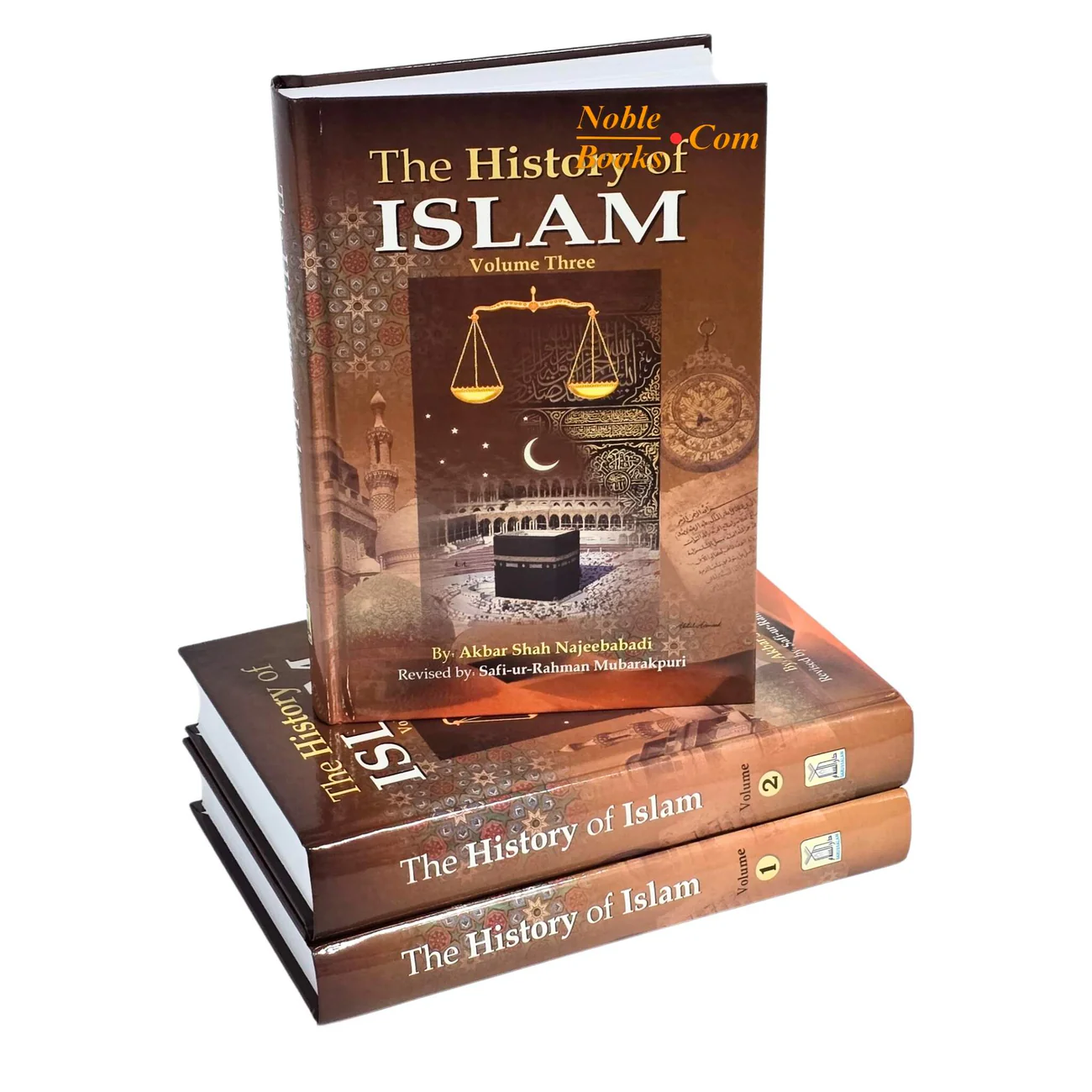The”History of Islam“(3 Vol. Set) by Akbar Shah Najeebabadi is an in-depth study of the development of Islam right from its inception to the present stage at which it exists today. It is such a broad work, carrying the reader through its virtual historical journey as it explains major events, important figures, and key moments that transformed the Islamic world. In this blog, we will look at this book’s importance, its contribution to the knowledge of Islamic scholarship, and the imperative lessons this book teaches for Muslims and non-Muslims.
The Significance of History of Islam by Akbar Shah Najeebabadi
The History of Islam (3 Vol. Set) is a landmark work in the Islamic literature of the world. Akbar Shah Najeebabadi, the renowned historian and scholar, exhaustively chronicles the emergence and spread of Islam throughout the world. His rigorous research and painstaking attention to detail breathe life into the history of Islam, offering a narrative that is both fascinating and instructive.
This work is particularly valuable because it is able to strike a balance between historical facts and insightful analysis. Najeebabadi does not just narrate events but makes critical reflections on the socio-political, cultural, and religious developments that formed Islamic civilization.
The First Volume: The Early Days of Islam and the Life of Prophet Muhammad (PBUH)
The first volume of History of Islam delves deep into the early beginnings of Islam, starting from the life of the Prophet Muhammad (PBUH). It takes readers through his early years, the revelation of the Quran, and his mission to spread the message of monotheism.
The early days of Islam were marred by challenges and resistance, not only from the Prophet’s very own tribe but also from the general people. Najeebabadi has described the circumstances of difficulties that Muhammad (PBUH) had to face and shows us how lessons can be learned from his resilience and steadfast faith in Allah.
Through this volume, readers will come to understand the importance of the Prophet’s mission and the founding of Islam in the Arabian Peninsula. The book also sheds light on the important battles of the early Muslim community, such as the Battle of Badr, the Battle of Uhud, and the Treaty of Hudaybiyyah, underlining the strategic decisions and spiritual lessons behind each event.
The Second Volume: The Expansion of Islam and the Era of the Rightly Guided Caliphs
In the second volume, Najeebabadi shifts his focus to the expansion of Islam beyond the Arabian Peninsula. This era, known as the Rashidun Caliphate, was a time of incredible growth for the Islamic state. Under the leadership of the first four caliphs-Abu Bakr, Umar, Uthman, and Ali-Islam spread rapidly across the Middle East, North Africa, and parts of Europe and Asia.
Najeebabadi gives exhaustive study on politics and military techniques adopted at the time and what it contributed toward the formation of the Islamic World. He does also examine in depth the controversies within the body of early Muslim community that formed the schism between Sunni and Shia Islam.
Among the best features of this book is a focus on the character of the first four caliphs and how they acted in line with justice, piety, and leadership. One of the qualities that Najeebabadi displays in his accounts of their ways of leading them provides useful teachings for contemporary Muslims regarding governance and community building.
The Third Volume: The Golden Age of Islam and Its Cultural, Scientific, and Political Achievements
In fact, the third volume of History of Islam transports readers into the Golden Age of Islam, in which flourishing culture, intellectual breakthroughs, and political consolidation dominate. Under the Umayyads, Abbasids, and later dynasties, the religion became the epitome of scientific discovery, cultural exchange, and economic prosperity.
This period also includes the era that witnessed important research in mathematics and astronomy, which led to profound discoveries in fields like medicine, philosophy, etc. The life of Al-Razi, Al-Farabi, Ibn Sina, Ibn Rushd – these figures formed the pillars in this age which Najeebabadi explains meticulously.
The third volume also talks about the growth of Islamic art, architecture, and literature besides the intellectual and scientific developments. Building magnificent mosques, creating intricate calligraphy, and preserving the texts of the ancient Greeks and Romans all helped in the building of Islamic civilization.
The Decline of the Islamic Caliphates: From the Mongol Invasion to Colonialism
The history of Islam is not without its periods of decline. In this section of the book, Najeebabadi examines the factors that contributed to the weakening of the Islamic caliphates, starting with the devastating Mongol invasions. These invasions marked the beginning of a long period of fragmentation, as various regions fell under the control of foreign powers.
Later, it was the onset of European imperialism that further made the Muslim world weak. Critically, he explores the after-effects of imperialism on the political, economic, and cultural lives of Muslim majorities. There are some prominent events in its modern history; the decline of the Ottoman Empire, the empire of Britain dominated India, and the French had colonized North Africa.
Despite these challenges, Najeebabadi emphasizes the resilience of the Muslim people who held onto their faith and values even in the face of tremendous challenges. Nationalist movements rose in the 20th century to mark a new era of self-determination for many nations that were majorly Muslim.
Relevance of History of Islam in Modern Times
In today’s rapidly changing world, the study of Islamic history holds great relevance. Najeebabadi’s History of Islam offers timeless lessons that can help Muslims navigate contemporary challenges. From the early struggles of the Prophet Muhammad (PBUH) to the intellectual contributions of the Golden Age, the history of Islam provides a rich source of inspiration for personal and collective growth.
Studying the history of Islam can be a great means of grabbing a deeper appreciation of this beautiful faith and its rich legacy for Muslims. At the same time, History of Islam is beneficial for non-Muslims who want to understand the cultural, political, as well as religious context within which Islam has progressed.
Conclusion: The Timeless Legacy of the History of Islam by Akbar Shah Najeebabadi
In conclusion, Akbar Shah Najeebabadi’s History of Islam (3 Vol. Set) is an essential work for anyone seeking to understand the vast also complex history of Islam. Through meticulous research also insightful analysis, Najeebabadi provides a detailed also engaging narrative that spans over 1,400 years of Islamic history.
This work offers readers a comprehensive understanding of the events, personalities, also cultural developments that have shaped the Muslim world. It is a must-read for anyone interested in gaining a deeper understanding of Islam also its impact on the world stage.
Read more: Stories of the Prophets By Hafiz Ibn Katheer Dimashqi



